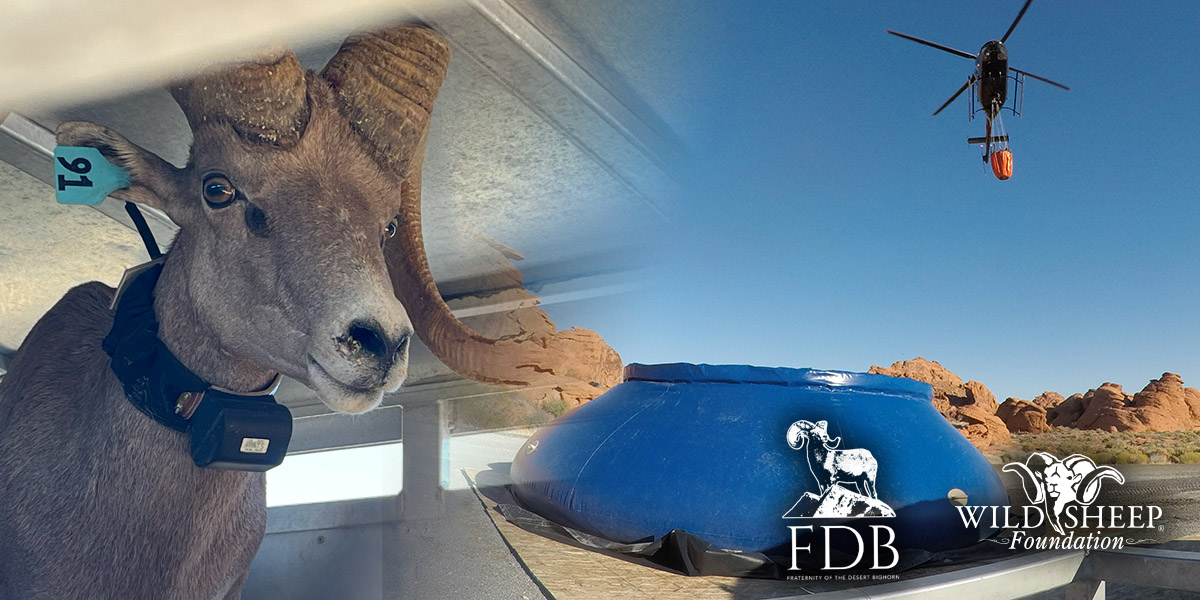
Las Vegas, Nevada & Bozeman, Montana — A significant trap and transplant operation occurred in mid-June in southern Nevada to aid a desert bighorn sheep population that has been at risk due to chronic drought conditions impacting both surface water and available forage. The Nevada Department of Wildlife (NDOW), KUIU, Grand Slam Club Ovis (GSCO), Fraternity of the Desert Bighorn (FDB), Nevada Bighorns Unlimited (NBU), the Wild Sheep Foundation (WSF), and a host of Nevada conservation NGOs partnered on a rescue mission.
A significant trap and transplant operation occurred in mid-June in southern Nevada to aid a desert bighorn sheep population that has been at risk due to chronic drought conditions impacting both surface water and available forage. The Nevada Department of Wildlife (NDOW), KUIU, Grand Slam Club Ovis (GSCO), Fraternity of the Desert Bighorn (FDB), Nevada Bighorns Unlimited (NBU), the Wild Sheep Foundation (WSF), and a host of Nevada conservation NGOs partnered on a rescue mission.
In one of Nevada's most significant and most urgent desert bighorn sheep projects in history, NDOW staff and partners wrapped up a six-month, $1.3 million effort to protect and manage sheep populations in southern Nevada - a project made necessary by one of the driest years on record. The project consisted of emergency water hauls by skilled firefighting helicopter pilots and ground crews, installation of remote watering devices, disease sampling, and clearances and agreements for establishment of a new bighorn herd, followed by aerial capture and relocation.
With critical water sources dried up or nearly so, emergency water hauls began in December 2024. In all, NDOW and volunteers and the Nevada Department of Forestry delivered over 148,000 gallons to 32 guzzlers across 17 mountain ranges (122,000 gallons, 27 remote guzzlers by helicopter). At the same time, remote monitoring systems (Ranchbots) were installed to enable real-time tracking of guzzlers and water levels.
"Emergency water hauls are unfortunately nothing new," said WSF's Gray N. Thornton, President & CEO. "However, this situation was different. Bringing water to this population wasn't enough to tide them over. Forage to support them was next to none. Up to 140 sheep needed to be moved to suitable habitat to avoid a disaster."
The final phase of the project was completed in mid-June, with 139 desert bighorn sheep being captured and translocated from the Muddy and Black Mountains to Nevada's Cortez Range and Tobin Range, as well as Utah's Promontory Point bighorn nursery.
This project, along with all collective efforts and pieces, has not only provided crucial water resources but also reduced herd numbers and alleviated pressure on drought-stressed vegetation and habitats. NDOW will continue to monitor habitat conditions and water levels.
"Swift active management in this situation was needed," stated Patrick Cummings, President of the Fraternity of the Desert Bighorn. "In all cases involving wild sheep, a collaborative conservation effort is required. Job one is rallying up the money. That was the easy part. Our community cares and acts."
NDOW was able to direct $500,000 from its Heritage Fund toward emergency water hauls and the transplant of desert bighorn sheep from the affected ranges in southern Nevada. KUIU and GSCO combined to pledge $250,000 in support of NDOW's actions. Fraternity of the Desert Bighorn, Nevada Bighorns Unlimited, and Wild Sheep Foundation each pledged $100,000 for a total of $1.05 million to address this water and habitat carrying capacity emergency.
"In the end, NDOW was able to capture, GPS collar, and safely release 58 sheep into the Cortez Mountains in northern Nevada," explained Clint Bentley, WSF Director and Past President of the Fraternity of the Desert Bighorn. "Another 43 sheep were moved to the Tobin Range, and 38 were transported with the aid of the Utah Wild Sheep Foundation into that neighboring state for a nursery herd managed by Utah's Division of Wildlife Resources. To further support the remaining sheep in the Muddy Mountains, supplemental water hauls will be provided to meet critical needs. A greatly needed and collaborative effort by all involved."
NDOW Director Alan Jenne's office thanked all the conservation partners involved with this effort. Huge thanks were extended to the Fraternity of the Desert Bighorn, Nevada Bighorns Unlimited (Reno, Elko, and Fallon), Wildlife Habitat Improvement of Nevada (WHIN), Meadow Valley Wildlife Unlimited, Nevada Dream Tag, Nevada Record Book, the Nevada Board of Wildlife Commissioner's Heritage Account, Valley of Fire State Park, KUIU Conservation Direct, Grand Slam Club-OVIS, Lake Mead National Recreation Area, Bureau of Land Management, Huntin' Fool, GoHUNT, Wild Sheep Foundation, US Fish and Wildlife Service, Utah Division of Wildlife Resources, Utah Wild Sheep Foundation, private landowners and NDOW staff.
FDB and WSF collectively extend their gratitude to NDOW and all the funding partners for their swift and generous response to this dire situation. "When our commitment is to do everything possible for a wildlife resource in the face of emerging challenges, it is heartening to see our community coming together for Nevada's desert bighorn sheep," Thornton concluded.
The Wild Sheep Foundation (WSF), based in Bozeman, Mont., was founded in 1977 by sportsmen and other wild sheep conservationists. WSF is the premier advocate for wild sheep, having raised and expended more than $145 million, positively impacting these species through population and habitat enhancements, research and education, and conservation advocacy programs in North America, Europe, and Asia "To Put and Keep Wild Sheep On the Mountain”. In North America, these and other efforts have increased bighorn sheep populations from historic lows in the 1950s-60s of 25,000 to more than 85,000 today. WSF has a membership of more than 11,000 worldwide.
Tags: Bighorn Sheep, Desert Bighorn, Press Release